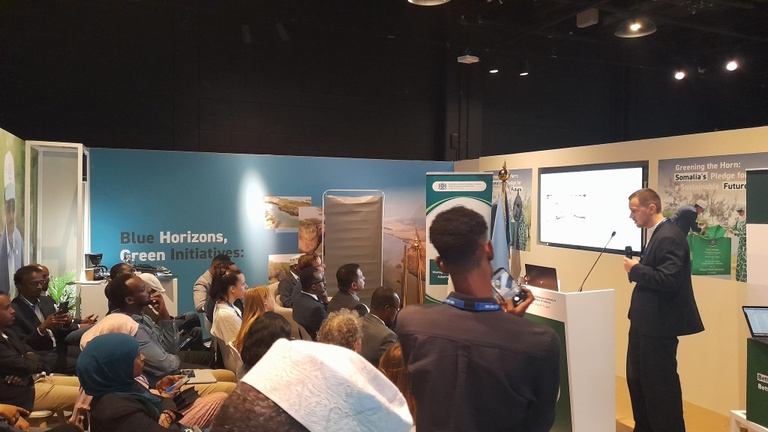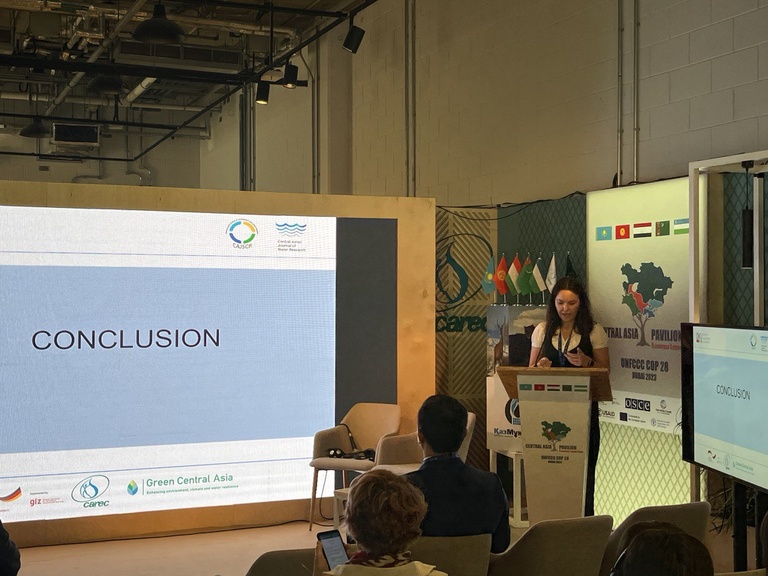
Scientists from the Potsdam Institute for Climate Impact Research (PIK), Dr Iulii Didovets, Dr Bijan Fallah, Stefanie Wesch and Prof Fred Hattermann contributed to various panels for the Central Asia region at the 28th Conference of the Parties (COP), which took place between the 30th of November and the 12th of December in Dubai. The COP meetings serve as a platform to assess the international progress of climate agreements and to communicate research results to a wider audience. PIK‘s participation is particularly important to provide valuable insights on climate change, data and solutions for global policy and action, inter alia in Central Asia, and capacity building opportunities for local stakeholders.
Dr Bijan Fallah gave a talk at COP28 on the 2nd of December as part of the side event “Regional Climate Change Adaptation Strategy in Central Asia” organized by the Central Asia Regional Pavilion. He presented his research on modelling climate change in Central Asia, focusing on the importance of high-resolution climate data for climate change impact studies in Central Asia. He also discussed the challenges for regional climate modelling in the region.
In addition, Dr Iulii Didovets contributed a keynote presentation of a study on climate change impacts on water resources and extreme events in the Juba Basin in Somalia on the 3rd of December. The research was a joint project of the Potsdam Institute for Climate Impact Research (PIK) and adelphi. The aim of the session was to present and discuss key findings of recent climate impact modelling in the Juba Basin, which is one of the most economically important river basins in Somalia and considered the countries bread basket, but suffers from recurrent floods and droughts, threatening livelihoods and food security in the basin. In this context, the Ministry of Energy and Water Resources of the Federal Government of Somalia (MoEWR), with funding from the United Nations Development Programme (UNDP), commissioned a study on the impacts of climate change on water resources and hydrological extremes in the basin. Ms Badra Yusuf of MoEWR moderated the launch event of the report, which provides insights into expected changes in precipitation, water availability and flooding in the future, but also discusses remaining uncertainties. Participants included H.E. Gamal M. Hassan, Director of the Centre of Excellence for Climate Adaptation and Environmental Protection, Dennis Taenzler, Head of Climate Policy at adelphi, Dr. Stefan Uhlenbrook, Head of Hydrology at the World Meteorological Organisation (WMO), and Volli Carucci, Director of Resilience and Food Systems at the World Food Programme (WFP). They all shared their professional perspectives on the impacts of climate change, recurrent floods and droughts in Somalia, and shared the need for further action to support livelihoods, food security and stability in the region.

On the 8th of December, Green Central Asia consortium members Potsdam Institute for Climate Impact Research (PIK), Kazakh-German University (DKU), German Research Centre for Geosciences (GFZ) jointly facilitated a COP28 side event entitled: "Assessing and Addressing Climate Change Impacts in Central Asia: Challenges and Solutions". The 90-minute session was held at the Central Asia Regional Economic Cooperation (CAREC) Central Asia pavilion at EXPO CITY Dubai, United Arab Emirates. Green Central Asia consortium members were joined by other international experts from Central Asia and beyond in order to discuss regional challenges and opportunities with regards to expected climate impacts and novel integrated approaches. PIK’s Stefanie Wesch and GFZ‘s Dr Abror Gafurov jointly moderated the 90-minute event, while PIK’s Dr Iulii Didovets gave a thematical input on climate and hydrological impacts. Among the topics that were discussed were: the science of climate change, its impacts on water resources, agriculture, ecosystems and food systems, as well as key economic, social and policy insights on the issue. As a result, important views from many perspectives and disciplines were provided on the critical issue of climate change in Central Asia and Afghanistan. The aim of the panel discussion was to raise awareness of the expected climate impacts in the under-researched region and to encourage increased publication activity to broaden the scientific base in the field of climate change in Central Asia and Afghanistan. In connection with this, the new regional scientific journal Central Asian Journal of Sustainability and Climate Research was introduced.

Furthermore, the official handover of Memorandum of Understanding took place between the Uzbek Ministry of Ecology, Environmental Protection and Climate Change and the Potsdam Institute for Climate Impact Research on the 8th of December. Both documents were signed by the minister and both directors. Official words of appreciation and intent were exchanged by both organizations on behalf of Green Vision Central Asia coordinator Stefanie Wesch and Advisor to the Minister of Ecology, Environmental Protection and Climate Change Sunna Julia Park at the end of the subsequent youth session entitled: “Empowering Futures: Youth Engagement and Sustainability”. During this session, youth representatives from Central Asia presented outcomes of their regional gathering as well as corresponding video material. In order to see the entire session click here.
On the 10th of December, Prof Fred Hattermann presented at the COP28 side event organized by the Ministry of Ecology, Environmental Protection and Climate Change of the Republic of Uzbekistan. The event, titled “Water-Energy-Food-Environment Security and Integration in Central Asia“ held at the CAREC-Central Asia Pavilion, focused on sustainable natural resource management in Central Asia. Prof Hattermann‘s presentation, addressing the potential impacts of climate change on water resources in the region, was a significant contribution to the session. His insights added depth to discussions about integrating national policies and enhancing transboundary cooperation. The event emphasized the development of regional adaptation strategies for climate and fostering cross-border collaboration in Central Asia.





